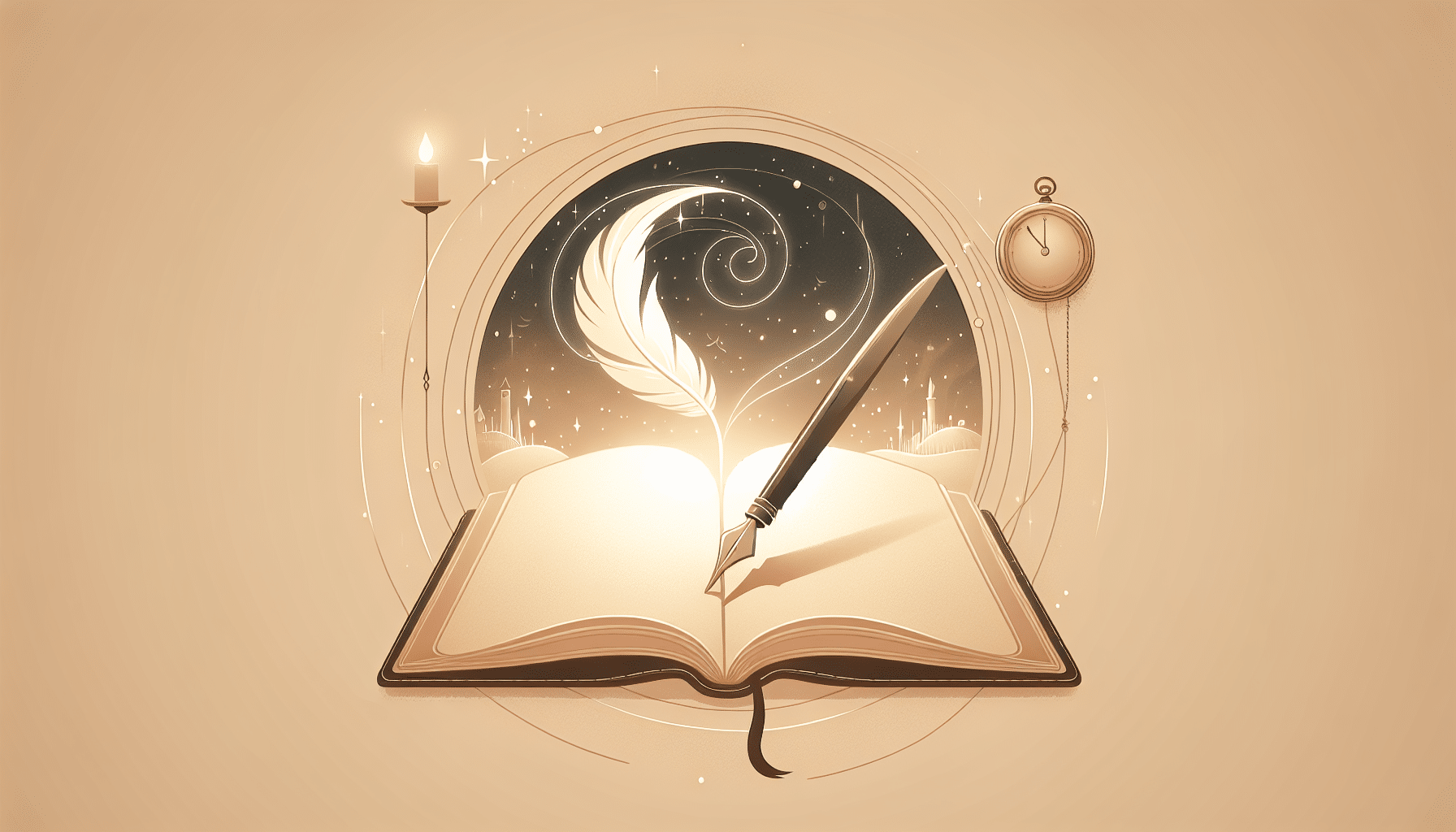It’s tricky, isn’t it? Finding the right writing prompts to spark your creativity can feel like hunting for a needle in a haystack. Whether you’re staring at a blank page or stuck in a writing rut, the right prompt can make all the difference in igniting your imagination and getting those words flowing.
But don’t worry! If you stick with me, I promise to share a treasure trove of prompts designed for every kind of writer—be it fiction, non-fiction, or poetry. You’ll discover how to leverage these writing tools to kickstart your projects, banish writer’s block, and keep your writing routine alive.
So let’s dive into the best prompts for eBooks, tackle some practical tips on making the most of them, and explore the myriad ways they can enhance your writing journey. Ready? Let’s get those creative juices flowing!
Key Takeaways
- Finding the right writing prompts can spark creativity and overcome writer’s block, making them valuable tools for every writer.
- Creative prompts can help develop unique characters and storylines, while non-fiction prompts encourage personal reflection and analysis.
- Using genre-specific prompts can guide your writing, allowing you to explore specific themes and styles effectively.
- Daily writing routines can be established with prompts, fostering consistent practice and skill improvement over time.
- Online resources, writing communities, and prompt books are excellent ways to discover new prompts and inspiration for your writing journey.

1. Best Prompts for eBooks
Writing prompts are an excellent tool for inspiring creativity and generating ideas for eBooks. They offer various scenarios, ideas, and themes that can jumpstart your writing process, whether you’re crafting a novel or an informative non-fiction piece.
1.1. Creative Writing Prompts
Creative writing prompts are designed to unlock your imagination and push your storytelling boundaries. Here are some prompts to help you get started:
- Write about a character who finds an old diary that changes the course of their life.
- Imagine a door that leads to a different time period. Write about what happens when your character steps through it.
- Create a story around a seemingly ordinary object that holds extraordinary powers.
- Describe a scene where two characters meet for the first time during a sudden storm.
Using these creative prompts can cultivate fresh ideas and characters for your project. They’re perfect for warming up your writing muscles or diving into a new project.
1.2. Non-Fiction Writing Prompts
Non-fiction writing prompts help you explore real experiences, share knowledge, or analyze topics in depth. Here are some prompts to kickstart your non-fiction writing:
- Reflect on a significant event that changed your perspective on life and write about it.
- Research a historical figure you admire and write a mini-biography highlighting their impact.
- Create a how-to guide on a skill you are proficient in, detailing the process step-by-step.
- Write a personal essay about a lesson learned from a failure or setback.
These prompts can drive you to gather your thoughts, analyze experiences, and share informative insights, making them invaluable for crafting essays, memoirs, or articles.
1.3. Genre-Specific Prompts
Genre-specific prompts cater to different writing styles and themes, providing tailored ideas for your work. Here are some prompts tailored to various genres:
- Fantasy: Write about a world where magic is illegal, and the consequences of practicing it.
- Science Fiction: Imagine a future where memories can be traded. What happens when a character loses their most treasured memory?
- Romance: Develop a storyline about two rivals who unexpectedly find themselves falling in love during a competition.
- Mystery: Create a plot where a detective must solve a case involving a priceless art heist and a hidden message in a painting.
These genre-specific prompts can inspire unique plots and characters, allowing you to explore themes and tropes within your preferred writing style.
2. How to Use Writing Prompts Effectively
Using writing prompts effectively can enhance your writing routine and boost creativity. Here are some actionable steps for making the most of these prompts.
2.1. Developing Story Ideas
Writing prompts can help develop story ideas by serving as a starting point for your narratives. To utilize them:
- Choose a prompt that sparks your interest.
- Spend a few minutes brainstorming potential plot points triggered by the prompt.
- Outline a basic structure, identifying your beginning, middle, and end.
- Set aside time to write regularly based on the ideas generated.
This structured approach can unlock new narratives and perspectives that you might not have considered before.
2.2. Overcoming Writer’s Block
If you’re struggling with writer’s block, prompts can be your best friend. Here’s how to use them to get back on track:
- Pick a random prompt and write without overthinking—set a timer for 10 minutes.
- Focus on free writing, letting your thoughts flow without editing.
- Choose another prompt after the timer goes off and repeat the process if needed.
- Use the ideas generated during these sessions as inspiration for future projects.
Regularly using prompts this way can stimulate your creativity and help you break through barriers.
2.3. Encouraging Daily Writing
Daily writing is essential for improving as a writer, and prompts can help build this habit. Try these tips:
- Set a specific time each day dedicated to writing. Consistency is key.
- Choose a daily prompt and challenge yourself to write for 15 minutes to an hour.
- Keep a journal of your responses to prompts and review them for growth.
- Share your work with a writing group for feedback and encouragement.
By integrating prompts into your routine, you’ll find it easier to write regularly and improve your skills over time.
3. Types of Writing Prompts
There are various types of writing prompts that can cater to different writing needs and stimulate creativity. Understanding the types available can help you choose the right ones for your projects.
3.1. Open-Ended Prompts
Open-ended prompts allow for flexible interpretations, inviting writers to explore various directions. Here are some examples:
- “What happens to a story when the main character makes the opposite choice?”
- “Describe a moment when a decision changed everything.”
- “Imagine a world where everyone can hear each other’s thoughts.”
These types of prompts encourage expansive thinking, giving room for creativity and diverse storytelling.
3.2. Character Development Prompts
Character development prompts focus on building compelling characters with depth. Here are some prompts to consider:
- Write a character sketch for someone who has a secret no one knows about.
- Describe a character’s biggest fear and how it manifests in their life.
- Devise a backstory for a villain who believes they are the hero in their own narrative.
These prompts can help you create rich, multidimensional characters that readers will connect with.
3.3. Setting and World-Building Prompts
Setting and world-building prompts assist in developing vivid and immersive environments for your stories. Use these prompts to enhance your settings:
- Describe a place your character considers home and what makes it special.
- Invent a new city and detail the unique customs or laws its inhabitants follow.
- Write about an environment (e.g., space, underwater, or a post-apocalyptic world) that drastically impacts your character’s journey.
Using such prompts can ground your stories in well-developed worlds, drawing readers deeper into your narratives.

4. Prompts for Different Genres
Different genres of writing call for unique approaches and ideas. Understanding prompts tailored to each genre can enhance your storytelling and help you discover different narrative styles.
4.1. Fiction Prompts for Various Genres
Fiction is a vast landscape, and genre-specific prompts can guide your creativity in exciting ways. Here are some prompts for popular genres:
- Thriller: Write a scene where a character receives an anonymous message that reveals a deep, dark secret.
- Fantasy: Pen a short story about a kingdom where dreams can be harvested and sold.
- Science Fiction: Imagine a world where time travel is a common vacation choice and explore the consequences that follow.
- Romance: Create a storyline revolving around two characters who meet through a mistaken identity.
Feel free to copy and paste these prompts into your writing tool or use them in ChatGPT. They can be great springboards to get you started on your next story.
4.2. Non-Fiction Prompts for Research and Essays
Writing non-fiction can be just as creative as fiction, especially when you have the right prompts. Here are some non-fiction prompts you can use:
- Write about a personal experience where you learned a hard lesson, focusing on the details that made it meaningful.
- Research and compare two different cultural rituals, explaining their significance and differences.
- Pen an article examining a social issue affecting your community, backed with statistics and personal stories.
- Compose a memoir piece reflecting on a family tradition and its impact on your identity.
Each prompt encourages you to dig deeper and think critically, making them perfect for essays or articles.
4.3. Poetry Prompts
Writing poetry often requires emotional depth and imagery. These prompts can help inspire your next poetic endeavor:
- Write a poem that starts with the line “The moment I saw the sunrise…” and explore your feelings about a new beginning.
- Create a poem using vivid imagery based on a favorite childhood memory.
- Experiment with form by writing a haiku about a fleeting moment in nature.
- Compose a free verse poem about a conversation you wish you could have with a historical figure.
Use these prompts to find your poetic voice and express your thoughts in unique ways.
5. Where to Find More Writing Prompts
Once you’ve explored a few prompts, you might wonder where to find even more inspiration. Here are some fantastic resources that can help you continue your writing journey.
5.1. Online Resources and Websites
The internet is a treasure trove of writing resources that provide prompts in various formats and styles. Here are some reliable places to check:
- Visit Writer’s Digest for a range of prompts, including poetry and general writing ideas.
- Check out Reedsy, which offers a generator for a new prompt each time you visit.
- Explore the writing prompt section on Goodreads, where users share their favorite prompts and ideas.
- Use Bored Panda for a fun collection of quirky and engaging prompts that might stimulate your creativity.
These sites often provide not only prompts but also community feedback, which can spur your development.
5.2. Writing Workshops and Communities
Joining writing workshops or communities can be another excellent way to find prompts. Here’s why you might want to get involved:
- Participate in local writing groups, often held at libraries or community centers, where prompts are shared regularly.
- Engage with online platforms like Writing.com to connect with fellow writers and exchange prompts.
- Consider workshops that focus on prompts, where feedback is given in real-time, enhancing your writing skills.
- Look for communities on social media platforms like Facebook or Discord, where you can find daily or weekly writing prompts shared among members.
These settings are perfect for fostering ideas and motivations beyond what you can find on your own.
5.3. Prompt Books and Journals
If you prefer a physical book as your writing companion, there are many prompt books and journals available. Here are some popular options:
- The Writer’s Idea Book by Jack Heffron is filled with prompts that encourage creativity across different genres.
- Writing Down the Bones by Natalie Goldberg not only provides prompts but also shares insights on writing as practice.
- Bird by Bird by Anne Lamott offers an inspiring take on writing, accompanied by prompts designed to take your writing further.
- Consider using specialty journals like The 5-Minute Journal, which includes prompts encouraging mindfulness and reflection.
These books can become cherished companions as you explore new writing avenues.

6. Tips for Creating Your Own Prompts
Creating your own writing prompts can be a fun and rewarding experience. It allows you to tailor prompts to your interests and writing style.
6.1. Personalizing Prompts
Start by reflecting on your personal interests and experiences. Think about what excites you about storytelling.
Now, craft a prompt that connects with those interests. For instance, if you love travel, try this:
- “Write about a journey that changes who you are as a person, focusing on the encounters along the way.”
Personalizing prompts makes them more engaging and relevant to you, helping you dive deeper into your writing.
6.2. Combining Ideas for Unique Prompts
Don’t be afraid to mix a couple of ideas to create something fresh. Take two prompts from different genres and see how they work together.
For example, combine a fantasy scenario with a romantic twist:
- “Write a romance set in a world where love is forbidden, exploring the challenges the couple faces.”
This can lead to unexpected twists and unique narratives that push your creativity.
6.3. Keeping Prompts Simple but Engaging
Sometimes, less is more. Focus on crafting simple prompts that stimulate thought without overwhelming you.
Here’s an easy one to get started:
- “Describe an ordinary day in an extraordinary way.”
This encourages you to explore your environment creatively while keeping the prompt straightforward and accessible.
7. Benefits of Using Writing Prompts
Using writing prompts offers numerous benefits that can enhance your writing journey.
7.1. Sparking Creativity
One of the most significant advantages is that prompts help spark creativity. When faced with a blank page, a prompt can provide the necessary push to start writing.
Try this prompt to ignite your imagination:
- “Imagine a world where all clocks run backward. Describe a day in that world.”
This kind of imaginative exercise encourages you to think outside the box and explore new ideas.
7.2. Building Writing Skills
Prompts also serve as excellent practice tools. They provide structured exercises that help you develop your writing skills.
For example, challenge yourself with this prompt:
- “Write a scene using only dialogue, demonstrating a conflict between two characters.”
Setting specific constraints can elevate your skill level and encourage growth in vocabulary and style.
7.3. Finding Your Writing Voice
Through repeated use of prompts, you can discover and refine your own writing voice. It’s an opportunity to explore different styles and tones.
Use this prompt to explore voice:
- “Write a letter to your future self, reflecting on who you are today.”
Writing in a personal way helps clarify your unique voice and expression while promoting self-reflection.
8. Examples of Popular eBook Writing Prompts
Finding inspiration from existing prompts is a great way to get started.
8.1. Sample Fiction and Non-Fiction Prompts
Here are some effective prompts that you can easily paste into ChatGPT:
- Fiction: “Write about a character who wakes up with no memory of who they are and must piece their identity back together.”
- Non-Fiction: “Reflect on a moment in your life where you took a risk. What was the outcome, and what did you learn?”
These prompts can help stimulate both creative and analytical writing.
8.2. Prompts from Published Authors
Many published authors use prompts to spark their creativity. Here’s a prompt inspired by renowned writers:
- “Imagine you stumble upon an enchanted object in an antique store. Write the story of what happens next.”
This type of prompt encourages imaginative storytelling and exploration.
8.3. Reader-Suggested Prompts
Don’t overlook community input. Here’s a reader-suggested prompt:
- “Describe a significant moment in your life as if it happened in a different era.”
Using prompts from readers can give you fresh perspectives and ideas to explore in your writing.
9. Writing Challenges and Prompts
Taking on writing challenges can push you beyond your comfort zone and improve your writing discipline.
9.1. 30-Day Writing Challenge Prompts
Consider a 30-day challenge where you write a short piece based on a daily prompt. Here’s an example of how you can format it:
- Day 1: “Write about a day that changed your life.”
- Day 2: “Describe a secret you’ve never told anyone.”
This structure keeps you engaged and accountable to your writing goals.
9.2. Monthly Prompts and Themes
For a structured approach, try focusing on monthly themes, which can help you hone in on specific topics. Here’s a prompt to kick off a month on relationships:
- “Write about the most meaningful relationship in your life and how it has shaped who you are.”
Themed prompts can provide clarity and focus in your writing practice.
9.3. Collaborating with Other Writers on Prompts
Collaborate with others to generate prompts or challenges. For example:
- “Pair up with a friend and each write a different ending to the same story prompt, then discuss your choices.”
This not only encourages creativity but also fosters community and constructive feedback.
FAQs
Writing prompts can spark creativity, help overcome writer’s block, and develop writing skills. They encourage daily writing habits, making it easier to find your unique voice and explore new ideas.
To use writing prompts effectively, focus on developing story ideas, overcoming writer’s block, and setting a daily writing routine. Treat prompts as a springboard to delve into your creative process.
You can find writing prompts through various online resources, writing workshops, and communities. Additionally, prompt books and journals are excellent sources for inspiration.
Writing prompts come in various types such as open-ended prompts, character development prompts, and setting/world-building prompts. Each type can help you explore different aspects of storytelling.
